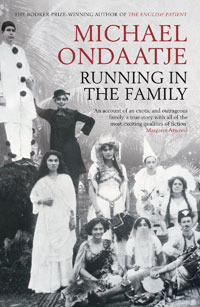What do you think?
Rate this book


235 pages, Paperback
First published January 1, 1982





And there was Lalla too, like a bee attracted to the perfume of any flower, who came up every other week solely to ransack the garden and who departed with a car full of sprigs and branches. With hardly any room to move or stretch, she rode back to Colombo, still as a corpse in a flower-packed hearse. In his last years my father was a founding member of “The Ceylon Cactus and Succulent Society” and this interest began during his time in Kuttapitiya—all because of his devious and defensive nature. He loved ordered gardens and hated to see beds ravaged by Lalla’s plundering. Gradually the vegetation at Kuttapitiya took on a prickly character. He began with roses, then Lalla wore gloves, and so he progressed to the cactus. The landscape turned grey around us. He welcomed the thorn bush, experimented with gnarled Japanese figs, retreated to pragmatic vegetables or spears of the succulent. His appreciation of growing things became more subtle, turned within a more limited spectrum and gradually Lalla’s visits tapered away. Her journeys were in any case made solely for the effect of arriving at friends’ houses in Colombo bearing soft rain-grown flowers.
Most of the events in the erotic literature of Asia, one suspects, must take place in the mountains…
She loved the thunder; it spoke to her like a king.
On my brother’s wall in Toronto are the false maps. Old portraits of Ceylon. The result of sightings, glances from trading vessels, the theories of sextant. The shapes differ so much they seem to be translations—by Ptolemy, Mercator, Francois Valentyn, Mortier, and Heydt—growing from mythic shapes into eventual accuracy. Amoeba, then stout rectangle, and then the island as we know it now, a pendant off the ear of India.
"Two days before he died we were together. We were alone in the house. I can't remember what we said but we sat there for three hours. I too don't talk too much. You know it is a most relaxed thing when you sit with a best friend and you know there is nothing you have to tell him, to empty your mind. We just stayed there together, silent in the dusk like this, and we were quite happy."
My Grandmother died in the blue arms of a jacaranda tree. She could read thunder.
Words such as love, passion, duty, are so continually used they grow to have no meaning—except as coins or weapons. Hard language softens. I never knew what my father felt of these "things." My loss was that I never spoke to him as an adult. Was he locked in the ceremony of being "a father"? He died before I even thought of such things.
During the monsoon, on my last morning, all this Beethoven and rain.